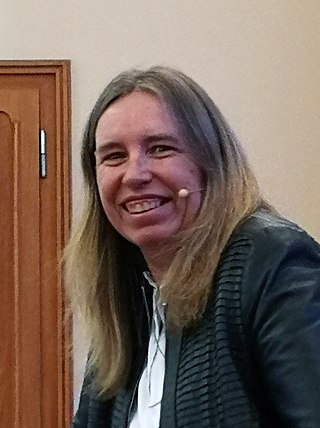The Max Planck Institute for Informatics is a research institute in computer science with a focus on algorithms and their applications in a broad sense. It hosts fundamental research as well a research for various application domains.

Dagstuhl is a computer science research center in Germany, located in and named after a district of the town of Wadern, Merzig-Wadern, Saarland.
Prof. Athanasios K. Tsakalidis is a Greek computer scientist, a professor at the Graphics, Multimedia and GIS Laboratory, Computer Engineering and Informatics Department (CEID), University of Patras, Greece.

The Gottfried Wilhelm Leibniz Prize, or Leibniz Prize, is awarded by the German Research Foundation to "exceptional scientists and academics for their outstanding achievements in the field of research". Since 1986, up to ten prizes have been awarded annually to individuals or research groups working at a research institution in Germany or at a German research institution abroad. It is considered the most important research award in Germany.

The Otto Hahn Medal is awarded by the Max Planck Society to young scientists and researchers in both the natural and social sciences. The award takes its name from the German chemist and Nobel Prize laureate Otto Hahn, who served as the first president of the Max Planck Society from 1948 to 1960.
The European Symposium on Algorithms (ESA) is an international conference covering the field of algorithms. It has been held annually since 1993, typically in early Autumn in a different European location each year. Like most theoretical computer science conferences its contributions are strongly peer-reviewed; the articles appear in proceedings published in Springer Lecture Notes in Computer Science. Acceptance rate of ESA is 24% in 2012 in both Design and Analysis and Engineering and Applications tracks.

Leonhard Wolfgang Bibel is a German computer scientist, mathematician and Professor emeritus at the Department of Computer Science of the Technische Universität Darmstadt. He was one of the founders of the research area of artificial intelligence in Germany and Europe and has been named as one of the ten most important researchers in German artificial intelligence history by the Gesellschaft für Informatik. Bibel established the necessary institutions, conferences and scientific journals and promoted the necessary research programs to establish the field of artificial intelligence.
Susanne Boll is a Professor for Media Informatics and Multimedia Systems in the Department of Computing Science at the University of Oldenburg, Germany. and is a member of the board at the research institute OFFIS. She is a member of SIGMM and SIGCHI of the ACM as well as the German Informatics Society GI. She founded and directs the HCI Lab at the University of Oldenburg and OFFIS.
Karl Leo is a German physicist.

Anja Feldmann is a German computer scientist.
The German Informatics Society (GI) is a German professional society for computer science, with around 20,000 personal and 250 corporate members. It is the biggest organized representation of its kind in the German-speaking world.
Dorothea Wagner is a German computer scientist, known for her research in graph drawing, route planning, and social network analysis. She heads the Institute of Theoretical Informatics at the Karlsruhe Institute of Technology.

Petra Schwille is a German professor and a researcher in the area of biophysics. Since 2011, she has been a director of the Department of Cellular and Molecular Biophysics at the Max Planck Institute for Biochemistry in Martinsried, Germany. She is known for her ground-laying work in the field of fluorescence cross-correlation spectroscopy, and numerous contributions on model membranes. Her current research focuses around bottom-up approaches to building an artificial cell within a broader area of synthetic biology. In 2010, Schwille received the Gottfried Wilhelm Leibniz Prize.

Thomas Lengauer is a German computer scientist and computational biologist.

Naveen Garg is a Professor of Computer Science in Indian Institute of Technology Delhi, specializing in algorithms and complexity in theoretical computer science. He was awarded the Shanti Swarup Bhatnagar Prize for Science and Technology, India's highest prize for excellence in science, mathematics and technology, in the mathematical sciences category in the year 2016. Naveen Garg's contributions are primarily in the design and analysis of approximation algorithms for NP-hard combinatorial optimization problems arising in network design, scheduling, routing, facility location etc.
Elena Conti is an Italian biochemist and molecular biologist. She serves as Director and Scientific Member of the Max Planck Institute of Biochemistry in Martinsried, Germany, where she uses structural biology and biophysical techniques to study RNA transport and RNA metabolism. Together with Elisa Izaurralde, she helped characterize proteins important for exporting mRNA out of the nucleus.
Hannah Bast is a German computer scientist known for her work on routing in transportation networks and search engines. She works as a professor at the University of Freiburg, where she holds the chair in algorithms and data structures and is dean of the faculty of engineering. She is one of the members of the Enquete Commission on Artificial Intelligence of the German federal parliament.
Bernt Schiele is a German computer scientist. He is Max Planck Director at the Max Planck Institute for Informatics and professor at Saarland University. He is known for his work in the field of computer vision and perceptual computing.
Nicole Megow is a German discrete mathematician and theoretical computer scientist whose research topics include combinatorial optimization, approximation algorithms, and online algorithms for scheduling. She is a professor in the faculty of mathematics and computer science at the University of Bremen.

The TUM School of Computation, Information and Technology (CIT) is a school of the Technical University of Munich, established in 2022 by the merger of three former departments. As of 2022, it is structured into the Department of Mathematics, the Department of Computer Engineering, the Department of Computer Science, and the Department of Electrical Engineering.









